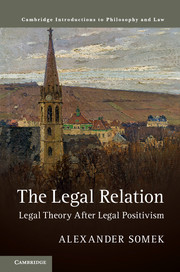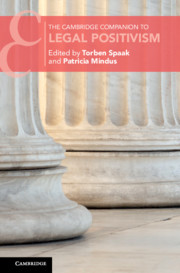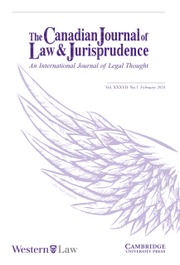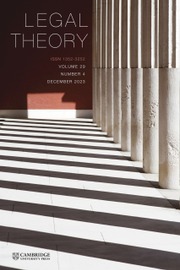The Legal Relation
Legal Theory after Legal Positivism
$40.99 (P)
Part of Cambridge Introductions to Philosophy and Law
- Author: Alexander Somek, University of Iowa
- Date Published: October 2017
- availability: Available
- format: Paperback
- isbn: 9781316648001
$
40.99
(P)
Paperback
Other available formats:
Hardback, eBook
Looking for an examination copy?
This title is not currently available for examination. However, if you are interested in the title for your course we can consider offering an examination copy. To register your interest please contact [email protected] providing details of the course you are teaching.
-
What is law? The usual answer is that the law is a system of norms. But this answer gives us at best half of the story. The law is a way of relating to one another. We do not do this as lovers or friends and not as people who are interested in obtaining guidance from moral insight. In a legal context, we are cast as 'character masks' (Marx), for example, as 'buyer' and 'seller' or 'landlord' and 'tenant'. We expect to have our claims respected simply because the law has given us rights. We do not want to give any other reason for our behavior than the fact that we have a legal right. Backing rights up with coercive threats indicates that we are willing to accept legal obligations unwillingly. This book offers a conceptual reconstruction of the legal relation on the basis of a critique of legal positivism.
Read more- Offers a conceptual reconstruction of the legal relation on the basis of a critique of legal positivism
- Explores a new way of thinking about sources of law
- Breaks ground into terrain beyond natural law theory
Reviews & endorsements
‘Alexander Somek, at the height of his powers, has already enjoyed a long and distinguished career. He is, unlike most of us, altogether at home in both worlds – the Anglophone world with its myopia and the Continental European world with its vast perspectives but, all too often, with analysis that falls short of the mark. Alexander Somek brings the best of both worlds together, and his manuscript is a welcome effort to redress the balance in favor of, as he puts it, a post-legal positivist theory of law.' Stanley L. Paulson, Washington University, St. Louis
See more reviews‘A mature masterpiece equaling Hart's Concept of Law or Dworkins Law's Empire in jurisprudential ambition, originality and sophistication, The Legal Relation is the most important Continental European contribution to jurisprudence in the new millennium.' Mattias Kumm, Inge Rennert Proffessor of Law at the New York University School of Law and Professor of Global Public Law in the Berlin Social Science Center
‘With this bold and provocative book, Somek brilliantly reimagines legal positivism. Every legal philosopher must read this book. The argument is imaginative, penetrating, and ultimately convincing.' Dennis Patterson, Board of Governors Professor of Law, Rutgers Law School, Camden, New Jersey
Customer reviews
17th Oct 2024 by UName-456522
A NEW LOOK AT THE LEADING ASPECT OF MODERN JURISPRUDENCE FROM PROFESSOR SOMEK An appreciation by Elizabeth Robson Taylor of Richmond Green Chambers and Phillip Taylor MBE, Head of Chambers and Reviews Editor, “The Barrister” It’s always useful to see a new book which might just help undergraduates understand the complexities of jurisprudence and legal theory. The subject remains disliked by so many law students as they see it as “political”, and “difficult” to understand complete with all the theorems and names of leading jurisprudents unknown outside our world of philosophy and law… plus the strange (to some) concepts of Hart and Dworkin! So, what is this one all about? Professor Alexander Somek states that “legal theory ought to explain why and how the law matters to our lives” whilst he admits that there is “an element of the Marxist critique of law”. He also writes that a “new beginning is needed”. “But”, he says, “where would one go when both legal and positivism and natural law theory drop out of the picture”? Step forward, then, a new name: Alexander Somek. He bases his work on a return to what he calls “the broader theoretical perspective from which modern legal positivism originated in the early work of Hans Kelsen, namely, constructivism”. This seminal work on what Somek entitles “The Legal Relation” “does not adopt any particular thinker”. As a new “thinker”, Somek covers legal theory after legal positivism with a most realistic overview of what we mean by a system of norms. There are six short chapters in total with an introduction and an epilogue in under 200 readable pages. And the author does remain faithful to what he calls “the original constructivist ethos of modern legal positivism”. Provocatively, Somek posits the old, old question - what is law? He replies with this comment: “the usual answer is that the law is a system of norms. But this answer gives us at best half of the story. The law is a way of relating to one another”. He goes on to compound his theory: “we do not do this as lovers or friends and not as people who are interested in obtaining guidance from moral insight”. One important point, Somek says, is that “in a legal context, we are cast as character masks ( from Marx), for example, as buyer and seller or landlord and tenant”. The conclusion is that we expect to have our claims respected simply because the law has given us rights. We found the emphasis on “Marx as a jurisprudent” to be quite helpful with the resurgence of this man’s frightening legacy on the development of human society in so many countries as such an obvious mechanism to create dictatorships. Somek concludes that we don’t want to give any other reason for our behaviour other than “the fact that we have a legal right. Backing rights up with coercive threats indicates that we are willing to accept legal obligations unwillingly. This book offers (us) a conceptual reconstruction of the legal relation on the basis of a critique of legal positivism”. The book was published on 30th November 2017. We suggest it will be a huge benefit to those students of jurisprudence who seek a higher level of research for their final degree classification.
Review was not posted due to profanity
×Product details
- Date Published: October 2017
- format: Paperback
- isbn: 9781316648001
- length: 220 pages
- dimensions: 228 x 152 x 12 mm
- weight: 0.31kg
- availability: Available
Table of Contents
Introduction. The pursuit of theory
1. Late legal positivism
2. Legality and irony
3. Legal science and the common law
4. The legal relation
5. Equality, freedom and dignity
6. The quest for agency.
Sorry, this resource is locked
Please register or sign in to request access. If you are having problems accessing these resources please email [email protected]
Register Sign in» Proceed
You are now leaving the Cambridge University Press website. Your eBook purchase and download will be completed by our partner www.ebooks.com. Please see the permission section of the www.ebooks.com catalogue page for details of the print & copy limits on our eBooks.
Continue ×Are you sure you want to delete your account?
This cannot be undone.
Thank you for your feedback which will help us improve our service.
If you requested a response, we will make sure to get back to you shortly.
×



